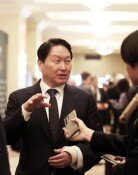[Editorial] Narrow-minded revenge against Hwang
[Editorial] Narrow-minded revenge against Hwang
Posted November. 23, 2000 20:37,
The National Intelligence Service (NIS) dismissed exiled ex-North Korean secretary Hwang Jang-Yop from his position as the chairman of the board of directors of the Institute of National Unification Policy. The NIS also requested Hwang to leave his safe residence under its protection. The NIS must review the sudden measures against Hwang since they obviously reflect its narrow-minded revenge for Hwang's recent public disclosure of his restricted freedom.
In our view, the government has an obligation to protect the safety of Hwang and his fellow political exile, Kim Dok-Hong, because they were assured of such protection when they defected to Seoul in 1997. According to the NIS, what matters to the intelligence agency is not so much his personal views on inter-Korean relations. Its greater concern is the fact that he is divulging internal information as a person who holds a senior position in the NIS-affiliated institute.
Nevertheless, the NIS must be careful in making the decision to transfer the special protection of the two prominent exiles to ordinary police protection. The risks and necessity for such a transfer must duly be weighed in making such a decision. The NIS should not engage in any emotional retaliation against them as to abandon them in the wilderness just because his views on North Korea and the way he expresses such views are unpalatable to the NIS.
Even if his views on Pyongyang are at loggerheads with the current inter-Korean developments, it will be wise to keep such views as a helpful reference needed for South-North relations. For, the undeniable fact here is that no South Korean experts or policy formulators on North Korea and their empirical analysis can possibly excel Hwang's understanding of the northern regime. It is, therefore, incumbent on the NIS to make use of Hwang's precious assets in its conduct of our North Korea affairs.
According to Hwang and Kim, all they wanted was a relaxation of the NIS' restrictions on their freedom of activity while residing in the safe residence under its protection. Moreover, they argue, when they decided to defect to the South, they were assured of their activities for the democratization of North Korea together with the guarantee of their personal safety. Naturally, they claim that Seoul must keep such promises.
Kim added that the success of the current South-North relations is a life and death issue for North Korea's future. Thus, Kim argues that the government need not worry about Pyongyang's possible negative reactions even if what we do here may offend the North, because Pyongyang cannot afford to sever the inter-Korean exchanges for its own sake.
Our proper courtesy called for the offering of the chairmanship of the NIS research institute and advisor's position respectively to Hwang and Kim. This being the case, their dismissal from their positions simply because their views go against the present administration's North Korea policies is not only hardly unjustifiable but, in particular, will mean the deprivation of their livelihood. If the NIS finds it difficult to keep them as senior officials of its affiliated institute, it must arrange other positions for them.
Apart from Hwang¡¯s case, the NIS has recently caused many controversies over its roles in inter-Korean affairs. As a matter of principle, it is not the proper role for the NIS to conduct negotiations with North Korea. The Ministry of Unification and the Ministry of Foreign Affairs and Trade are the government's proper departments for any affairs regarding negotiations with North Korea. The NIS is to monitor and counter North Korea for any crisis or eventualities.
Yet, NIS Director Lim Dong-Won has always been the administration's point man to conduct our North Korea negotiations. This is a typical case that shows the government's policies are carried out not by what the rules and procedures of the relevant laws prescribe, but by the persons and personalities with powerful influence. Now is the time that the NIS must return to its proper position to assume its function as the nation's intelligence agency.







